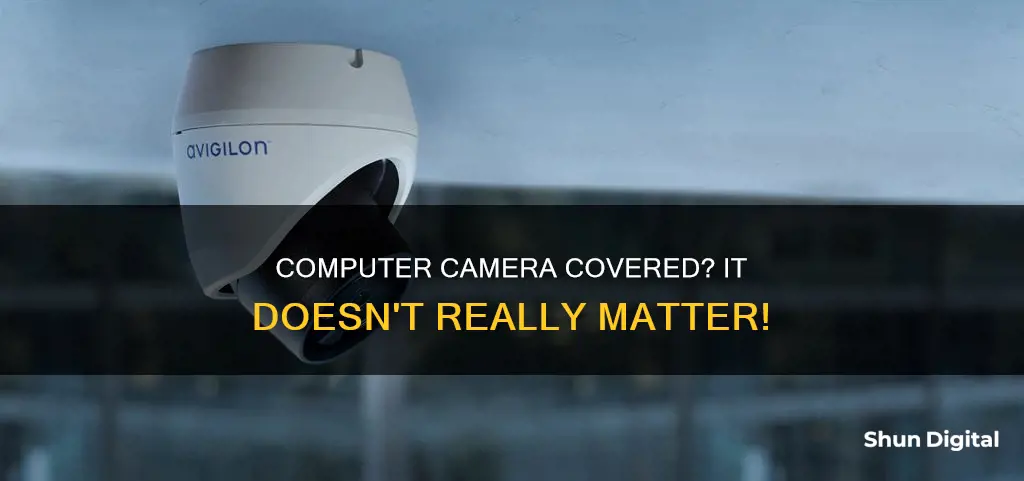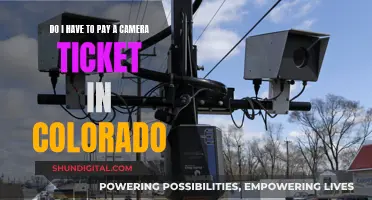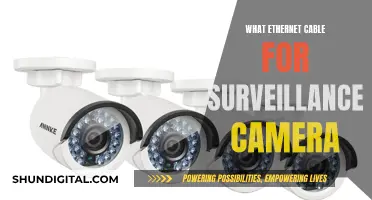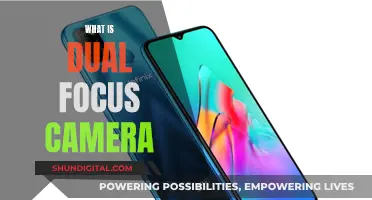
Covering your computer camera is a common practice for those concerned about their privacy and security. While it may provide some peace of mind, the effectiveness of this measure has been questioned. Security experts suggest that it is unlikely for cybercriminals to actively spy on individuals through their webcams. However, the camera can still be a potential entry point for hackers, who can gain access through outdated operating systems or compromised apps with camera permissions. In addition, there are now many other cameras, such as those on wearable devices, that can capture our activities, making it challenging to ensure complete privacy. While a physical cover can be a simple and inexpensive solution, it may not address the broader concerns surrounding the proliferation of cameras in our daily lives.
| Characteristics | Values |
|---|---|
| Reasons for covering | Prevent accidental sharing of video |
| Prevent potential embarrassment | |
| Prevent hacking | |
| Peace of mind | |
| Reasons against covering | Unnecessary if you have a firewall |
| Unlikely that cybercriminals are watching | |
| Unlikely that IT professionals will access your camera | |
| Unlikely that a hacker would have your password | |
| Other ways to protect privacy |
What You'll Learn

It's unlikely that cybercriminals are actively watching you
It's highly unlikely that cybercriminals are actively watching you through your computer camera. Asaf Ashkenazi, chief operating officer of the security company Verimatrix, agrees that it's improbable that cybercriminals are sitting at the other end of a compromised webcam, watching your every move.
However, this doesn't mean that your device's camera isn't a potential gateway for spying. Hackers can gain access to your camera in several ways, such as exploiting outdated operating systems or compromising apps you've granted camera access to. Therefore, while it's unlikely that someone is watching you, taking simple precautions like covering your camera can give you peace of mind.
Outdated operating systems are one way hackers could gain access to your camera. Software updates usually include fixes for security vulnerabilities, so the longer you go without updating, the more likely your system contains bugs that hackers could exploit. Turning on automatic updates is a good way to avoid potential security issues.
Additionally, apps are another avenue for hackers to access your webcam. Each time you grant an app permission to use your camera, you're entrusting your privacy to the company that manages that app. That company's security measures may or may not be sufficient to protect your data from outside hackers. The app itself could even be malware designed specifically to spy on its users. Regularly reviewing and revoking camera access for apps you don't trust is a good practice to maintain your privacy.
While it's improbable that cybercriminals are actively watching you, taking basic precautions like keeping your software updated, being cautious about granting camera permissions to apps, and physically covering your camera when not in use, can help ensure your privacy and give you peace of mind.
Tasco Trail Camera: Loading Batteries for Optimum Performance
You may want to see also

Modern computers require explicit permission to access the camera
In addition to these software protections, hardware-level protections have also been implemented. For instance, the issues of 15 years ago, where you could turn on the camera without enabling the LED, have been long addressed. Now, if the camera has power, the LED does too, and it's not software-related.
While these protections do not guarantee that hackers cannot access your camera, they do provide layers of security that make it harder for unauthorised access to occur. As such, while it may not be necessary to cover your computer camera, it is still a good idea to be vigilant about the permissions you grant to apps and regularly review and revoke those that are no longer needed.
Surveillance Cameras: Best Picks for Your Security Needs
You may want to see also

Outdated operating systems are more vulnerable to hacking
Covering your computer camera may provide peace of mind, but it does not address the underlying issue of outdated operating systems being more vulnerable to hacking. While a physical cover can prevent unwanted surveillance, it does not protect against other forms of cyberattacks. Outdated operating systems pose significant cybersecurity risks and can leave your computer system vulnerable to various threats. Here's why:
Lack of Security Updates and Patches
Outdated operating systems often lack critical security updates and patches. As operating systems age, they become more susceptible to new and emerging threats. Without ongoing support and updates, these systems remain vulnerable to attack. Manufacturers release updates to address security flaws and improve protection, so it's crucial to stay current.
Incompatible with New Security Technologies
New security features may not be compatible with older operating systems. For example, newer operating systems may offer better encryption algorithms that are not available on older systems, making them more resistant to data theft attacks. By using an outdated operating system, you miss out on these enhanced security measures.
Lack of Modern Security Features
Outdated operating systems often lack modern security tools such as two-factor authentication, intrusion detection systems, firewalls, and antivirus software. These tools play a crucial role in fortifying your system against potential attacks. By using an older operating system, you are missing these additional layers of protection.
Easy Target for Attackers
Attackers often deliberately target outdated operating systems because they know that many users neglect to update their systems regularly. These outdated systems become low-hanging fruit for cybercriminals, who can exploit known vulnerabilities to gain access to sensitive information or launch attacks on other systems.
Examples of Attacks Targeting Outdated Operating Systems
The WannaCry ransomware attack in 2017 is a notable example. It exploited a vulnerability in the Windows operating system that had already been patched by Microsoft. However, many organizations had not installed the update, leading to widespread disruption and financial losses. This illustrates how failing to update your operating system can have severe consequences.
In conclusion, while covering your computer camera may provide a sense of privacy, it does not address the more significant issue of outdated operating systems being vulnerable to hacking. To protect your data and privacy effectively, it is essential to prioritize keeping your operating system up to date, along with implementing additional security measures.
Transferring Camera Footage to Your Computer: A Step-by-Step Guide
You may want to see also

Apps with camera access can compromise your privacy
Apps that have access to your camera can also collect data such as photos, videos, and even infrared or depth data. This data can be shared with third parties, including analytics and advertising providers, payment processors, and cloud storage companies. While this data sharing is often necessary for the app's functionality, it is important to be aware of the potential risks involved.
For example, each time you grant an app camera access, you are putting your privacy in the hands of the company that manages the app. This company may or may not have adequate security measures in place to protect your data from outside hackers. Additionally, the app itself could be malware designed specifically to spy on its users.
To protect your privacy, it is crucial to be vigilant about which apps you grant camera access to and to regularly review and revoke access for apps that no longer need it. It is also important to keep your operating system and software updated, as outdated systems are more vulnerable to hackers.
While covering your computer camera can provide some peace of mind, it is just one aspect of maintaining your privacy in an increasingly digital world.
Charging BP-511A Camera Batteries: Picking the Right Charger
You may want to see also

Tape or stickers can leave residue on your camera
Covering your laptop's camera with tape or stickers is a common practice for those concerned about their privacy and security. While this approach may provide some peace of mind, it's important to consider the potential drawbacks, such as the residue that these adhesives can leave behind.
Over time, the adhesive on tape and stickers can break down, leaving a sticky residue on your camera lens. This residue can be challenging to remove and may require special cleaning solutions or tools. Some people have suggested using rubbing alcohol, vinegar, or even nail polish remover to dissolve the sticky residue, but these liquids can be harsh and may damage the camera lens or surrounding areas.
Additionally, the process of removing the residue can be time-consuming and delicate. You may need to use a combination of scraping, scrubbing, and soaking to fully remove the residue, being careful not to damage the camera or other sensitive components of your laptop.
Another consideration is the potential impact on your laptop's warranty. Some manufacturers may consider the use of adhesive products on the camera lens as tampering, which could void your warranty.
As an alternative to tape and stickers, you could consider purchasing a physical camera cover that attaches to your laptop. These covers can be easily opened or closed, providing a more convenient way to control your privacy without the risk of leaving behind any residue.
Updating Camera Raw: Elements 14 Edition
You may want to see also
Frequently asked questions
Covering your computer camera may give you peace of mind, but it is probably not worth the effort. It is unlikely that cybercriminals are interested in watching your mundane activities.
If your computer has an indicator light for the camera, it should turn on whenever the camera is active. However, this light is often controlled by software, and hackers can find ways to circumvent it.
While it is improbable that you will be personally targeted by cybercriminals, there is still a risk of your camera being compromised. Hackers can gain access through outdated operating systems or apps with camera permissions.
To reduce the risk of camera snooping, keep your operating system and software updated, and regularly review the apps that have permission to access your camera. Additionally, be cautious when granting camera access to new apps.







